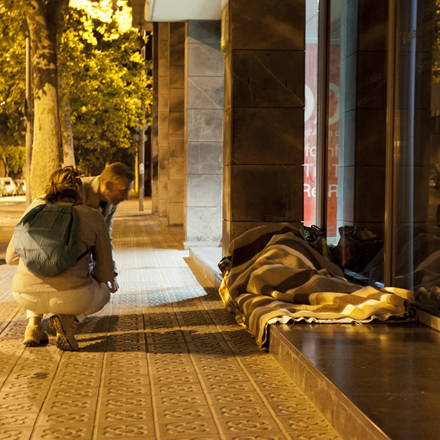
After increasing concerns from the housing sector, the UK government recently extended the ban on possession proceedings in England and Wales until 20 September. Patrick Duce shares some experiences from across a selection of European countries all concerned about the impact lifting the ban would have.
In March, a direction was issued by the UK government to pause all possession proceedings in the courts of England and Wales in response to the COVID-19 crisis. Since then, no possession hearings have been in heard in the courts, despite UK housing charity Shelter reporting an estimated 227,000 private tenants are currently in arrears.
While the extension has been welcomed, it has raised major concerns that it has merely offered a stay of execution and a very short delay to what could be a catastrophe for homelessness, pushing huge numbers of people into a position where they have nowhere to live.
The UK is not isolated in implementing so called ‘evictions bans’, and the move is mirrored across Europe as governments have acted swiftly to protect renters from the ongoing economic fallout from COVID-19. Evidence collected through the European End Street Homelessness Campaign throughout the summer has demonstrated that while measures implemented have provided some relief for homelessness agencies to focus on supporting those already on the streets, grave concerns are felt across Europe about what happens next.
As the deadline for the recent short extension on possession proceedings in England and Wales draws closer, John Hamblin, CEO of Shekinah Housing in Plymouth and Torbay, South West England, shared the following concerns about the measures implemented in England.
“Whilst we have welcomed the temporary measures to prevent evictions, we know that we are still facing a potential perfect storm. Whilst positive for many people, we also know that the ban has made some landlords rethink their positions, which may in the long-term see a reduction in available accommodation for the people we support. My concern is that with the current economic conditions and ongoing uncertainty, we face the real possibility of homelessness in England returning to levels not seen for decades. Without urgent long-term investment in social housing and the ending of Section 21 no fault evictions, we may well look back and realise we missed a once-in-a-lifetime opportunity to address the injustice of homelessness.”
In Spain, the government declared a ‘State of Alarm’, introducing a suspension on evictions and automatic six-month extension of contracts due to expire. These measures effectively meant that landlords could not evict tenants or raise rent until the end of 2020. Vanesa Cenjor Del Rey, Director of International Affairs at the national homelessness organisation HOGAR SÍ, said:
“Spain was one of the first countries to ban evictions and during the state of alarm, this was a good measure to protect vulnerable people. However, when this measure has expired, and taking into account the number of people at risk has risen because of the crisis, it will be necessary to implement integrated policies to support all those persons to maintain their housing. Housing is a right and must be protected.”
The experiences of homelessness organisation Arrels Fundació in Barcelona, however, have found that the situation is more complicated in Catalonia. Director Ferran Busquets told us: “We have found that despite the ‘State of Alarm’, many people have still lost their accommodation. According to data from Barcelona City Council, approximately a third of the emergency places for people experiencing homelessness [during COVID-19] have been for people who did not previously live on the street, but have been left without accommodation during the crisis of COVID-19.”
In Brussels too, despite swift action to rehouse street homeless people in a range of temporary accommodation, the measures to protect renters have had the following impact, according to Adrienne Van Vyve, Co-ordinator of a street outreach team in the city.
“The [evictions ban] measure offered a certain stability in a period of significant uncertainty and certainly made it possible, until 31 August, to prevent a new flow of people falling onto the streets. This did not, however, prevent our field teams from meeting new vulnerable groups on the street.”
Ultimately though, she says despite the “moratorium having the effect of preventing people from arriving on the streets, this does not mean that people had the opportunity to find solutions to their situation… a significant increase in homelessness is expected.”
Not for the first time, Scotland showed willing to take steps further and earlier this summer, when they not only extended the ban on evictions to March 2021, but the Homelessness and Rough Sleeping Action Group (HARSAG) included this in 105 recommendations to the Scottish Government, which accepted every one. Margaret-Ann Brünjes, Chief Executive of Homeless Network Scotland, outlines the importance of their approach.
“The intended further extension of eviction protection to 2021 announced by the Scottish Government is subject to parliamentary approval soon, but if agreed, is a positive step for all the same reasons as the original measures. A further extension would allow time for landlords, advice agencies and welfare rights advisors to work with people to improve their current situations where possible, to reduce the numbers at risk of losing their home from spring of 2021.”
The common thread from speaking with professionals across Europe is one of acknowledgement of interventions that have – to date – undoubtedly saved many lives during the onslaught of this global pandemic. However, what our campaign from across Europe tells us is that responses to the COVID-19 global pandemic have been short-term fixes and fall short of truly addressing a broken housing system. Governments across Europe need to show real vision and bold leadership to take the necessary action that is so urgently needed.
The genuine solutions to street homelessness have not changed despite the global pandemic. Ultimately, without more housing being built, access to permanent housing will never be adequate. We must work towards providing everyone who is street homeless with a safe and secure home, so that they have the best chance to keep it and stop the cycle of revolving homelessness. This can never be tackled if the flow of people leaving insecure housing and onto the streets continues.
Image: Juan Lemus (Arrels Fundació)




Join the discussion